Live on the homepage now!
Reader Supported News
Ted Cruz wants the Court to kill an important anti-corruption law.
The case concerns federal campaign finance laws, and, specifically, candidates’ ability to loan money to their campaigns. Candidates can do so — but in 2001, Congress enacted a provision that helps prevent such loans from becoming a vehicle to bribe candidates who go on to be elected officials. Under this provision, a campaign that receives such a loan may not repay more than $250,000 worth of the loan using funds raised after the election.
When a campaign receives a pre-election donation, that donation is typically subject to strict rules preventing it from being spent to enrich the candidate. After the election has occurred, however, donors who give money to help pay off a loan from the candidate effectively funnel that money straight to the candidate — who by that point could be a powerful elected official.
A lawmaker with sufficiently clever accountants, moreover, could effectively structure such a loan to allow lobbyists and other donors to help the lawmaker directly profit from it. According to the Los Angeles Times, for example, in 1998, Rep. Grace Napolitano (D-CA) made a $150,000 loan to her campaign at 18 percent interest (though she later reduced that interest rate to 10 percent). As of 2009, Napolitano reportedly raised $221,780 to repay that loan — $158,000 of which was classified as “interest.”
So in 11 years, the loan reportedly earned Napolitano nearly $72,000 in profits.
And that brings us back to the Ted Cruz for Senate lawsuit. Sen. Ted Cruz (R-TX) wants the Supreme Court to strike down the limit on loan repayments to federal candidates. That decision could potentially enable any lawmaker to make a high-dollar, high-interest loan to their campaign, and then use that loan as a vehicle to funnel donations directly into their pocket. (Pre-2001 FEC rulings permitted candidates to make loans to their campaign at “a ‘commercially reasonable rate’ of interest,” but that apparently did not stop Napolitano from making a loan at a double-digit interest rate.)
And even if lawmakers do not enrich themselves by making high-interest loans to their campaign, the fact remains that every dollar a campaign donor gives to help a campaign pay back a loan from the candidate goes straight into that candidate’s pocket. As the Justice Department argues in its brief defending against Cruz’s lawsuit, “a contribution that adds to a candidate’s personal assets (and that can accordingly be used for personal purposes) poses a far greater threat of corruption than a payment that merely adds to a campaign’s treasury (and that can accordingly be used only for campaign purposes).”
Cruz claims that permitting such contributions is necessary to protect “the rights of candidates and their campaign committees to make constitutionally protected decisions about when and how much to speak during an election.”
While a decision in Cruz’s favor could effectively make it legal for wealthy donors to bribe lawmakers, Cruz has a very good chance of prevailing in a Supreme Court where Republicans control six of the Court’s nine seats.
Although current precedents nominally permit Congress to enact campaign finance laws to prevent “corruption and the appearance of corruption,” the Court’s decision in Citizens United v. FEC (2010) defined the word “corruption” so narrowly that it is basically meaningless. And the current Court is significantly more conservative than the one that handed down Citizens United a dozen years ago.
Justice Brett Kavanaugh, for example, suggested in a 2002 email that he wrote while he was a White House official that there are “some constitutional problems” with laws placing a cap on how much an individual donor can give to a candidate — something that even decisions like Citizens United permit.
Similarly, just last July, the Supreme Court voted along party lines to block a California rule requiring certain political donors to be disclosed, and it did so despite the fact that Citizens United explicitly held that disclosure laws stand on strong constitutional footing.
There is a very real chance, in other words, that a Supreme Court hostile to campaign finance regulation will join Cruz’s crusade. And if the Court does so, that could effectively make it legal to bribe many members of Congress.
Ted Cruz manufactured a fake dispute in order to bring this lawsuit
Cruz admits that he engineered this lawsuit specifically so he can challenge the restriction on loan repayments.
According to the Justice Department, on the day before the 2018 election, Cruz lent his campaign $260,000, or $10,000 more than the amount that can legally be repaid from post-election funds. Moreover, while a federal regulation permits Cruz’s campaign to pay back all of that money using funds raised before the election, so long as it did so no later than 20 days after the election, the campaign waited until after this deadline had passed to pay back $250,000 of the $260,000 loan.
And, just in case there’s any doubt why Cruz and his campaign entered into this unusual arrangement, Cruz and his campaign do not contest that “the sole and exclusive motivation behind Senator Cruz’ actions in making the 2018 loan and the committee’s actions in waiting to repay them was to establish the factual basis for this challenge.” Cruz was essentially willing to risk $10,000 of his own money for an opportunity to knock down a federal anti-corruption law.
The Justice Department, for what it’s worth, argues that these machinations should doom his suit, citing Supreme Court cases establishing that plaintiffs may not use federal courts to remedy “self-inflicted injuries” — though, as Cruz’s lawyers note in their brief, it is common for civil rights plaintiffs to use similar tactics to engineer lawsuits challenging race discrimination, and the Court has permitted such tactics in the past. So it is far from clear that Cruz is not allowed to bring this suit.
And even if the Court were to dismiss Cruz’s suit, it is likely that some other candidate would make a legitimate loan to their campaign, and then bring a similar lawsuit.
So, in other words, even if the Court decided to avoid the issues presented by this case and to dismiss Cruz’s suit, that decision would only likely delay the inevitable.
The Supreme Court enables corruption by defining the word “corruption” narrowly
The Supreme Court established in Buckley v. Valeo (1976) that lawmakers may enact campaign finance regulations that mitigate “the danger of corruption and the appearance of corruption.” Yet, while Citizens United purported to leave this aspect of Buckley in place, it severely curtailed the government’s ability to fight “corruption” by defining that word very narrowly.
Specifically, Citizens United held that federal and state campaign finance laws may only target “quid pro quo” arrangements, where money is offered in return for “political favors.” After Citizens United, Congress may still ban donors from explicitly promising to write a lawmaker a check if that lawmaker changes their vote on a pending bill. But other forms of corruption are protected by the Supreme Court’s understanding of the Constitution.
Indeed, Justice Kennedy’s opinion in Citizens United framed influence-buying by donors as an affirmative good:
Favoritism and influence are not . . . avoidable in representative politics. It is in the nature of an elected representative to favor certain policies, and, by necessary corollary, to favor the voters and contributors who support those policies. It is well understood that a substantial and legitimate reason, if not the only reason, to cast a vote for, or to make a contribution to, one candidate over another is that the candidate will respond by producing those political outcomes the supporter favors. Democracy is premised on responsiveness.
If you accept the legitimacy of this reasoning, then Cruz has a strong case. Sure, striking down the restrictions on repaying loans from candidates would allow lobbyists and wealthy donors to put money directly into the pockets of lawmakers. But, under the definition of “corruption” advanced by Citizens United, it’s not entirely clear why lawmakers may not charge lobbyists $1,000 an hour for their time — so long as the lawmakers and the lobbyist do not reach an explicit quid pro quo agreement regarding some policy matter before Congress.
If the Court does want to establish that elected officials may not rely on Citizens United to personally enrich themselves, Ted Cruz for Senate gives the Court a perfect opportunity to do so. The Justice Department argues that the Court should uphold the loan repayment provision challenged by Cruz because it enables personal donations to lawmakers that are different in kind from the ones imagined by the Court’s earlier campaign finance cases.
“When a campaign uses a contribution to fund routine campaign activities, the contribution helps the candidate by marginally improving his chance of victory, but it does not add to the candidate’s personal wealth,” the Justice Department argues in its brief. “But when a campaign uses a contribution to repay the candidate’s loan, every dollar given by the contributor ultimately goes into the candidate’s pocket.”
The Justice Department also cites a list of existing ethical rules, including a congressional rule forbidding members of the House and Senate from accepting gifts of more than $50, which prevents federal officials from using their office to enrich themselves. And it notes that the Constitution itself recognizes the danger of federal officials accepting personal gifts, forbidding them from accepting “any present, emolument, office, or title, of any kind whatever, from any king, prince, or foreign state.” (Though, in fairness, the courts didn’t exactly enforce this provision with any kind of rigor when Donald Trump was president.)
Thus far, however, the Roberts Court has shown little inclination to rein in the power of wealthy donors to shape elections — or to spend money in order to maximize their influence over lawmakers. Perhaps the Court will decide in Ted Cruz for Senate that putting money directly into a Congress member’s pocket goes too far.
But, given the Court’s record, I wouldn’t bet on it.
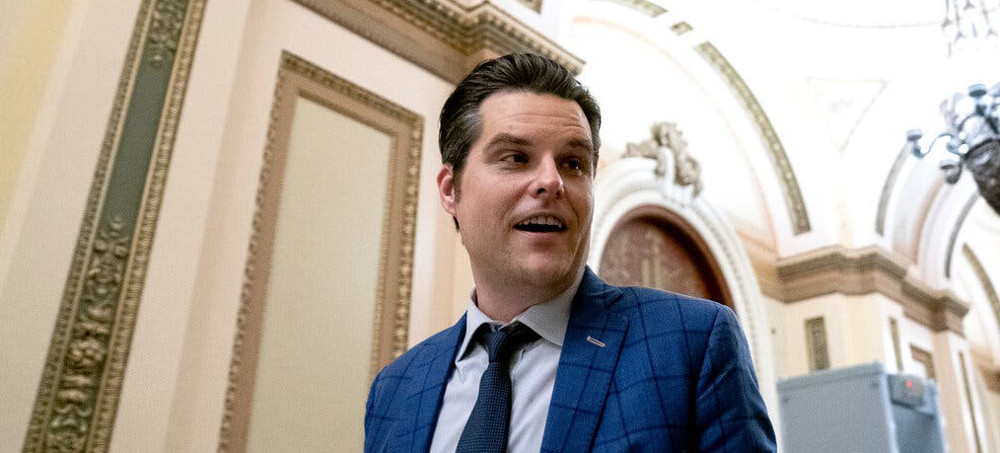 Investigators began seeking evidence and testimony in late 2020 from a former girlfriend of Representative Matt Gaetz, Republican of Florida. (photo: Stefani Reynolds/The New York Times)
Investigators began seeking evidence and testimony in late 2020 from a former girlfriend of Representative Matt Gaetz, Republican of Florida. (photo: Stefani Reynolds/The New York Times)
Reports from NBC News and CNN reported seeing the woman enter the federal courthouse in Orlando on Wednesday with her attorney.
The sighting could be a troubling development for the Northwest Florida Republican congressman that federal prosecutors are moving closer to indicting him.
NBC News reported that the ex-girlfriend, whose name was withheld to respect her privacy, has been in talks with prosecutors for an immunity deal in exchange for testifying about whether Gaetz had sex with a 17-year-old female for money in 2017.
Gaetz has not been charged with a crime and has repeatedly denied all accusations and called the federal investigation into him a "witch hunt."
"We have seen no credible basis for a charge against Congressman Gaetz," said Isabelle Kirshner, a New York-based attorney representing Gaetz, in a statement to the News Journal on Wednesday. "We remain steadfast in our commitment to challenge any allegations with the facts and law."
Citing legal sources familiar with the case, NBC News said the investigation into Gaetz is now focused on three crimes: sex trafficking the 17-year-old; violating the Mann Act, which prohibits taking women across state lines for prostitution and obstructing justice.
NBC News reported that the investigation into Gaetz stalled last year as prosecutors sought the cooperation of Gaetz's ex-girlfriend, whose testimony is crucial to the case, citing sources familiar with the investigation.
Gaetz's ex-girlfriend was in an open relationship with him in 2017 and 2018 and allegedly discussed other women he was involved with, NBC News reported.
Allegations that Gaetz paid for sex with a 17-year-old in 2017 became public last spring as Gaetz's former friend and Seminole County Tax Collector Joel Greenberg was indicted for sex trafficking.
Greenberg has since pleaded guilty to six of 33 charges against him including sex trafficking in a plea deal with prosecutors to testify against Gaetz in exchange for a lighter sentence.
Greenberg's sentencing has been delayed pending his cooperation in the case against Gaetz.
 Troops are seen Thursday at the main square of Almaty, where hundreds of people have been protesting against the government. (photo: Mariya Gordeyeva/Reuters)
Troops are seen Thursday at the main square of Almaty, where hundreds of people have been protesting against the government. (photo: Mariya Gordeyeva/Reuters)
ALSO SEE: Russian Troops Move to Put Down "Violent"
Uprising in Kazakhstan
About 12,000 people arrested in wake of recent protests
Some even went to morgues to see if a loved one was among the scores killed in the unprecedented violence in the Central Asian nation.
Authorities have refused to allow relatives or lawyers to see those in custody, giving little information about them, according to human rights activists.
The demonstrations began Jan. 2 in the western part of Kazakhstan over a sharp rise in fuel prices and spread throughout the country, apparently reflecting wider discontent with the government, which declared a state of emergency for the whole country and asked a Russia-led military alliance to send in troops to help restore order.
Another 1,678 people were arrested in the past 24 hours in Almaty, the largest city that was hit hardest by the turmoil, and more than 300 criminal investigations have been opened.
President Kassym-Jomart Tokayev blamed the unrest on foreign-backed "terrorists," but did not provide any evidence, and had given shoot-to-kill orders to security forces to quell the unrest.
Outside a branch of the Internal Affairs department that housed a large detention centre, a man who gave his name only as Renat said he has been waiting nearly a week to see or get any information about a close friend, Zhandos Nakipovich. He said Nakipovich, whom he described as being like "a brother" to him, was taken into custody on Jan. 4 during a peaceful protest.
"He was at first held at a precinct, then they told us he was in the Internal Affairs department," Renat told The Associated Press. "Since Jan. 6, we've been here and we don't know whether he's alive or not."
Military checkpoints prevented anyone from getting close to the building.
"Neither lawyers nor relatives — no one is allowed inside. Lawyers should be present during interrogation, but as you see, no one can pass," said Galym Ageleuov, head of the Liberty human rights group, who was waiting at the barricade.
"The checkpoint blocks the access for lawyers and relatives to see what's going on there. We don't even have the list of detainees," Ageleuov said.
More than a dozen men and women in dark winter clothes gathered outside one of Almaty's morgues, with some of them waiting to collect the bodies of relatives killed in the unrest. Huddled together in small groups, they stood at the gate of the facility, chatting quietly with each other but refused to talk to a reporter.
Although the official death toll was announced as 164, Tokayev has said hundreds of civilians and security forces were killed and injured.
Life in Almaty has started returning to normal after days of unrest that saw cars and buses torched, government buildings stormed and set ablaze, the airport seized and the sound of gunfire ringing out. The unrest had largely ended by last weekend.
Authorities in the energy-rich country of 19 million sought to mollify the anger at the government by capping fuel prices for 180 days. The Cabinet resigned, and longtime former leader Nursultan Nazarbayev was ousted from his influential post of head of the National Security Council. Nazarbayev had stepped down as president in 2019 after nearly three decades in power, but retained influence in the security forces.
The military alliance Tokayev asked for help, the Collective Security Treaty Organization, sent over 2,000 troops to Kazakhstan. Tokayev said they will start withdrawing Thursday.
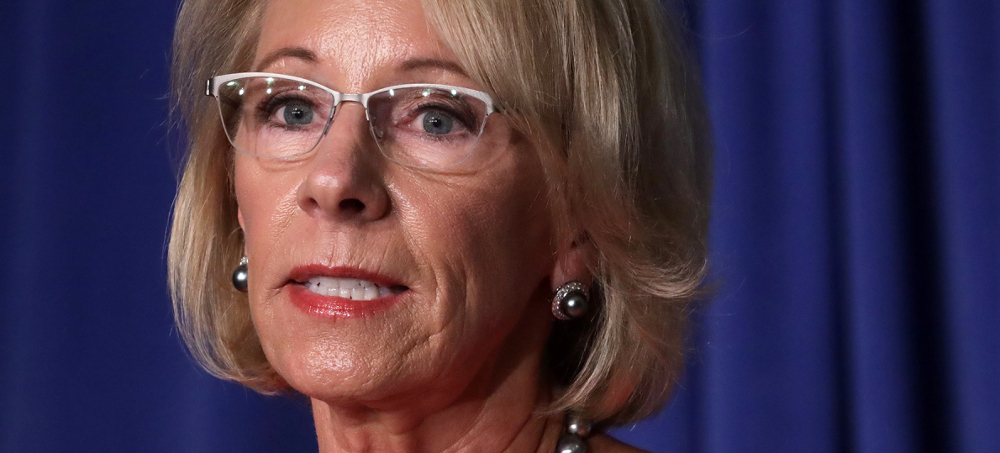 The Dick and Betsy DeVos Foundation donated $240,000 to Claremont Institute, which has been a driving force behind the effort to use bogus fraud claims to change election laws. (photo: Alex Wong)
The Dick and Betsy DeVos Foundation donated $240,000 to Claremont Institute, which has been a driving force behind the effort to use bogus fraud claims to change election laws. (photo: Alex Wong)
Conservative mega-donors including the DeVoses and Bradleys are pumping big money into the Claremont Institute think tank that fueled Trump’s election-fraud fantasies
Conservative mega-donors like what they see.
The biggest right-wing megadonors in America made major contributions to Claremont in 2020 and 2021, according to foundation financial records obtained by Rolling Stone. The high-profile donors include several of the most influential families who fund conservative politics and policy: the DeVoses of West Michigan, the Bradleys of Milwaukee, and the Scaifes of Pittsburgh.
The Dick and Betsy DeVos Foundation donated $240,000 to Claremont in 2020 and approved another $400,000 to be paid out in the future, tax records show. The Bradley Foundation donated $100,000 to Claremont in 2020 and another $100,000 in 2021, according to tax records and a spokeswoman for the group. The Sarah Scaife Foundation, one of several charities tied to the late right-wing billionaire Richard Mellon Scaife, supplied another $450,000 to Claremont in 2020, according to its latest tax filings.
Claremont’s own tax filings show that its revenue rose from 2019 to 2020 by a half-million dollars to $6.2 million, one of the highest sums since the organization was founded in 1979, according to the most recent available data. A Claremont spokesman said the group wouldn’t comment about its donors beyond publicly available data but estimated that Claremont’s revenue for the 2021 fiscal year had increased to $7.5 million.
The DeVoses, Bradleys, and Scaifes are among the most prominent donor families in conservative politics. For Bradley and Scaife, the giving to Claremont tracks with a long history of funding right-wing causes and advocacy groups, from the American Enterprise Institute think tank and the “bill mill” American Legislative Exchange Council, to anti-immigration zealot David Horowitz’s Freedom Center and the climate-denying Heartland Institute.
Bradley in particular has given heavily to groups that traffic in misleading or baseless claims about “election integrity” or widespread “voter fraud.” Thanks to a $6.5 million infusion from the Bradley Impact Fund, a related nonprofit, the undercover-sting group Project Veritas nearly doubled its revenue in 2020 to $22 million, according to the group’s tax filing. Bradley is also a long-time funder of the Heritage Foundation, which helped architect the wave of voter suppression bills introduced in state legislatures this year, and True the Vote, a conservative group that trains poll watchers and stokes fears of rampant voter fraud in the past.
But while the Bradley donations are to be expected, the contributions from the Dick and Betsy DeVos Foundation to Claremont are perhaps more surprising. Betsy DeVos, in one of her final acts as Trump’s education secretary, condemned the “angry mob” on January 6 and said “the law must be upheld and the work of the people must go on.”
A spokesman for the DeVoses, Nick Wasmiller, said Betsy DeVos’s letter “speaks for itself.” He added: “Claremont does work in many areas. It would be baseless to assert the Foundation’s support has any connection to the one item you cite.” While the foundation’s 2020 tax filing said its grants to Claremont were unrestricted, Wasmiller said the filing was wrong and the money had been earmarked. However, he declined to say what it was earmarked for.
The donations flowing into Claremont illustrate that although the group’s full-throated support for Trump and fixation on election crimes may be extreme, they’re not fringe views when they have the backing of influential conservative funders. “Were it not for the patronage of billionaire conservatives and their family foundations, the Claremont Institute would likely be relegated to screaming about its anti-government agenda on the street corner,” says Kyle Herrig, president of government watchdog group Accountable.US.
The Claremont spokesman responded to Herrig’s comment by saying “We think the dark money behind Accountable.US, under left-wing umbrella groups like Arabella Advisors, are threats to democracy and Western civilization. We defer to Herrig’s expertise on street corners.”
The Claremont Institute’s mission, as its president, Ryan Williams, recently put it, is to “save Western civilization.” Since the 2016 presidential race, Claremont tried to give an intellectual veneer to the frothy mix of nativism and isolationism represented by candidate Donald Trump. The think tank was perhaps best known for its magazine, the Claremont Review of Books, and on the eve of the ’16 election, the Review published an essay called “The Flight 93 Election,” comparing the choice facing Republican voters to that of the passengers who ultimately chose to bring down the fourth plane on September 11th. If conservatives didn’t rush the proverbial cockpit, the author, identified by the pen name Publius Decius Mus, “death is certain. To compound the metaphor: a Hillary Clinton presidency is Russian Roulette with a semi-auto. With Trump, at least you can spin the cylinder and take your chances.”
The essay’s author, later revealed to be a conservative writer named Michael Anton, went to work in the Trump White House, which made sense given his description in “Flight 93 Election” of “the ceaseless importation of Third World foreigners with no tradition of, taste for, or experience in liberty means that the electorate grows more left, more Democratic, less Republican, less republican, and less traditionally American with every cycle.”
Former Claremont scholars said they were aghast by the think tank’s full-on embrace of Trump in 2016. “The Claremont Institute spent 36 years as a resolutely anti-populist institution, [and] preached rightly that norms and institutions were hard to build and easy to destroy, so to watch them suddenly embrace Trump in May 2016 was like if PETA suddenly published a barbecue cookbook,” one former fellow told Vice News.
In recent years, the think tank courted controversy when it awarded paid fellowships to Jack Posobiec, a right-wing influencer who was an early promoter of the Seth Rich and Pizzagate conspiracy theories, and Charlie Kirk, head of the pro-Trump activist group Turning Point USA who has pushed baseless election-fraud theories and vowed to defend young people who wouldn’t refused vaccination from what he called “medical apartheid.”
But Claremont wouldn’t fully land in the spotlight until the end of Trump’s presidency. On Jan. 6, John Eastman, a law professor and Claremont scholar, spoke at the “Save America” rally on Jan. 6, 2021, that preceded the Capitol insurrection. Eastman repeated several election-related conspiracy theories, alleging that “machines contributed to that fraud” by “unloading the ballots from the secret folder,” a version of the rampant conspiracy theories spread by Trump campaign lawyers about the company Dominion Voting Systems.
As would later be revealed, Eastman also wrote two memos outlining a plan for how then-Vice President Mike Pence could overturn the 2020 result on January 6. “The main thing here is that Pence should do this without asking for permission — either from a vote of the joint session or from the Court,” Eastman wrote. “Let the other side challenge his actions in court…” (Worth noting: The Claremont Review would later publish its own critique of Eastman’s memos by a professor of government and ethics at Claremont McKenna college. After walking through a key piece of Eastman’s argument, the professor, Joseph Bessette, wrote: “One doesn’t have to be a scholar of the American Founding, a professor of constitutional law, or an expert in election law to know that this simply cannot be right.”)
Claremont continues to push the stolen-election myth and has apparently helped state lawmakers draft legislation to make election laws more favorable to the Republican Party. In October, Claremont President Ryan Williams told an undercover liberal activist that Eastman was “still very involved with a lot of the state legislators and advising them on election integrity stuff.”
Williams went on to tell the undercover activist, Lauren Windsor, that Eastman’s position was this: “Look, unless we get right what happened in 2020, there’s no moving on. They’re just going to steal every subsequent election.”
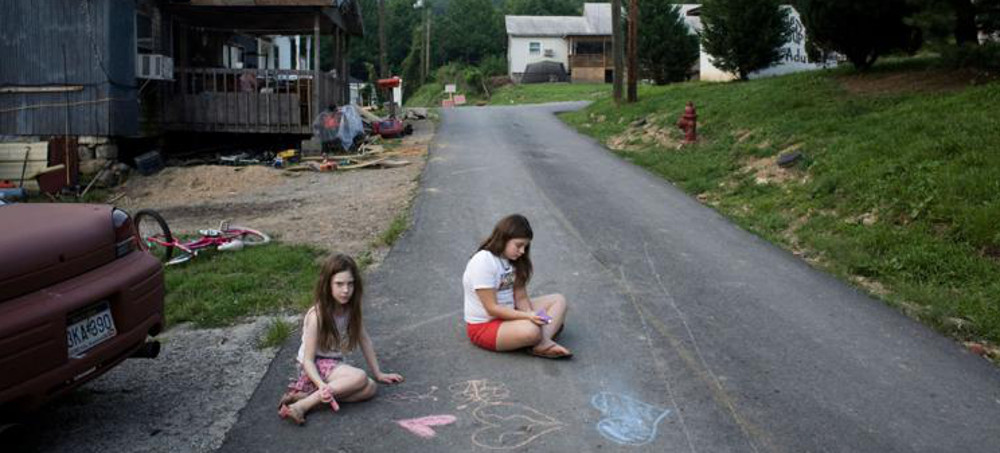 Most West Virginia families used their child tax credit payments for basic necessities like food, utilities and education costs. (photo: The DA)
Most West Virginia families used their child tax credit payments for basic necessities like food, utilities and education costs. (photo: The DA)
Most West Virginia families used their child tax credit payments for basic necessities like food, utilities and education costs.
Since July 2021, millions of families across the country began receiving special payments from the federal government under the advanced child tax credit program as part of President Biden’s American Rescue Plan. In West Virginia, more than 300,000 children received those payments, but Sen. Joe Manchin (D), who represents West Virginia, hasn’t been a fan of the program.
Manchin previously said he wants additional stipulations attached to the child tax credit program, like requiring parents to work and to limit payments to families making $60,000 or less annually.
"Don't you think, if we're going to help the children, that the people should make some effort?," argued Manchin while appearing on CNN's "State of the Union" in September.
However, advocates in Machin’s home state of West Virginia are pointing out just how significant the child tax credit program has been. The West Virginia Center on Budget … Policy (WVCBP) estimates 93 percent of children in West Virginia received those payments, with most households getting between $250 to $300 per child every month.
Even at the national level, the child tax credit payments made a significant impact. The Center on Poverty … Social Policy estimated 3.8 million children avoided poverty in November 2021, with the child tax credit program contributing to a 5.1 percent reduction in child poverty compared to what it would have been without the payments.
Despite the positive gains, Congress wasn’t able to extend the program and the final child tax credit payment was distributed to families last month. Due in part to Manchin’s opposition, the future of the child tax credit program remains uncertain.
In West Virginia, that means 50,000 children are now at risk of slipping into poverty, according to data by WVCBP.
Most West Virginia families used their child tax credit payments for basic necessities, with 77 percent of recipient households using the money for food, 57 percent spending it on utilities, and nearly 40 percent spending it on education costs.
“Making these changes permanent is a key provision of the Build Back Better agenda, and should be a top priority for West Virginia’s congressional leaders. The expanded credit is already leading to an historic reduction in poverty in the state,” said Sean O’Leary, a senior policy analyst at WVCBP, in a blogpost.
Growing up in poverty causes lasting harm, with the Center on Budget and Policy Priorities (CBPP) noting that poverty can bring unstable housing, frequent moves, inadequate nutrition and high family stress. All of that can often take a heavy toll on children, leading to lower levels of educational attainment, lower earnings, higher likelihood of getting arrested and poor health in adulthood.
Now that the additional income from the child tax credit payment program is gone, families in West Virginia are feeling the pinch.
“That money gave us breathing room, so we were not so stressed about bills and rent constantly. In the future it will help us save money and one day be able to purchase a house,” said Erin, a West Virginia parent responding to WVCB’s call to families on the impact of not having the child tax credit payment program payments.
About 17 percent of all children living in the U.S. are living in poverty, which equates to nearly 12 million kids, according to the Annie E. Casey Foundation. In West Virginia, about 20 percent of children were living in poverty in 2019.
Experts worry the gains families were able to make last year because of the child tax credit could be lost for good and are imploring Manchin to help bring it back to life in Biden’s Build Back Better act.
“The expansion of the child tax credit (CTC) brought historic child poverty reductions in West Virginia and around the country—progress that will be lost if Senator Manchin does not support continuing the program,” said Kelly Allen, executive director of WVCBP, to Changing America in an emailed statement.
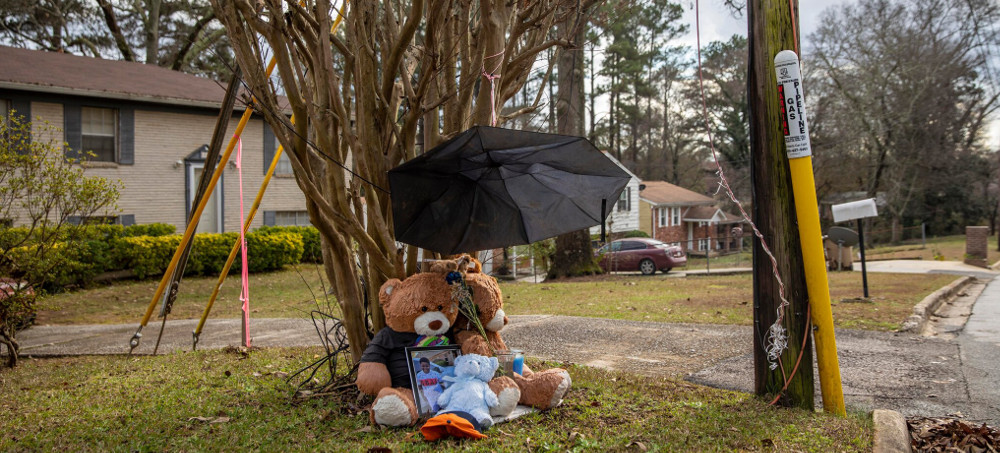 A memorial along Westbury Road in Riverdale, Ga., near the place Elyjah Munson, 11, was shot and killed while walking home from school. (photo: Alyssa Noel Pointer/The New York Times)
A memorial along Westbury Road in Riverdale, Ga., near the place Elyjah Munson, 11, was shot and killed while walking home from school. (photo: Alyssa Noel Pointer/The New York Times)
Toddlers are discovering guns under piles of clothes and between couch cushions. Teenagers are obtaining untraceable ghost guns made from kits. Middle school students are carrying handguns for protection.
On Dec. 9, her goofy, football-loving 11-year-old son, Elyjah, and some friends were walking to a gas station for after-school snacks when one of Elyjah’s best friends, a 12-year-old, pulled a gun from a backpack and shot Elyjah in the head.
It was the second time last year that the family had been jolted by gun violence. Two weeks before Elyjah was killed, his 5-year-old cousin, Khalis Eberhart, was fatally shot after a 3-year-old cousin found a gun under a sofa cushion.
 Ocean heating driven by human-caused climate crisis, scientists say, in sixth consecutive year record has been broken. (photo: iStock)
Ocean heating driven by human-caused climate crisis, scientists say, in sixth consecutive year record has been broken. (photo: iStock)
Ocean heating driven by human-caused climate crisis, scientists say, in sixth consecutive year record has been broken
The heating up of our oceans is being primarily driven by the human-caused climate crisis, scientists say, and represents a starkly simple indicator of global heating. While the atmosphere’s temperature is also trending sharply upwards, individual years are less likely to be record-breakers compared with the warming of the oceans.
Last year saw a heat record for the top 2,000 meters of all oceans around the world, despite an ongoing La Niña event, a periodic climatic feature that cools waters in the Pacific. The 2021 record tops a stretch of modern record-keeping that goes back to 1955. The second hottest year for oceans was 2020, while the third hottest was 2019.
“The ocean heat content is relentlessly increasing, globally, and this is a primary indicator of human-induced climate change,” said Kevin Trenberth, a climate scientist at the National Center for Atmospheric Research in Colorado and co-author of the research, published in Advances in Atmospheric Sciences.
Warmer ocean waters are helping supercharge storms, hurricanes and extreme rainfall, the paper states, which is escalating the risks of severe flooding. Heated ocean water expands and eats away at the vast Greenland and Antarctic ice sheets, which are collectively shedding around 1tn tons of ice a year, with both of these processes fueling sea level rise.
Oceans take up about a third of the carbon dioxide emitted by human activity, causing them to acidify. This degrades coral reefs, home to a quarter of the world’s marine life and the provider of food for more than 500m people, and can prove harmful to individual species of fish.
As the world warms from the burning of fossil fuels, deforestation and other activities, the oceans have taken the brunt of the extra heat. More than 90% of the heat generated over the past 50 years has been absorbed by the oceans, temporarily helping spare humanity, and other land-based species, from temperatures that would already be catastrophic.
The amount of heat soaked up by the oceans is enormous. Last year, the upper 2,000 meters of the ocean, where most of the warming occurs, absorbed 14 more zettajoules (a unit of electrical energy equal to one sextillion joules) than it did in 2020. This amount of extra energy is 145 times greater than the world’s entire electricity generation which, by comparison, is about half of a zettajoule.
Long-term ocean warming is strongest in the Atlantic and Southern oceans, the new research states, although the north Pacific has had a “dramatic” increase in heat since 1990 and the Mediterranean Sea posted a clear high temperature record last year.
The heating trend is so pronounced it’s clear to ascertain the fingerprint of human influence in just four years of records, according to John Abraham, another of the study’s co-authors. “Ocean heat content is one of the best indicators of climate change,” added Abraham, an expert in thermal sciences at University of St Thomas.
“Until we reach net zero emissions, that heating will continue, and we’ll continue to break ocean heat content records, as we did this year,” said Michael Mann, a climate scientist at Penn State University and another of the 23 researchers who worked on the paper. “Better awareness and understanding of the oceans are a basis for the actions to combat climate change.”
Follow us on facebook and twitter!
PO Box 2043 / Citrus Heights, CA 95611

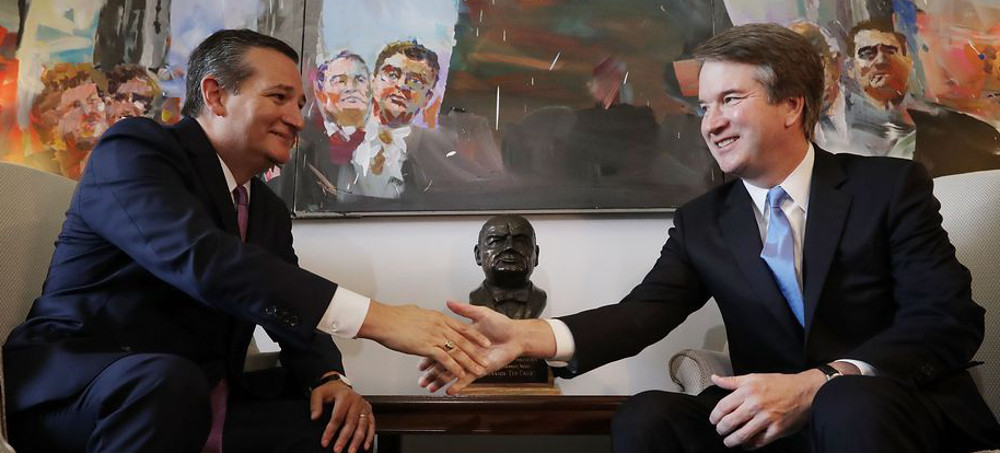

No comments:
Post a Comment